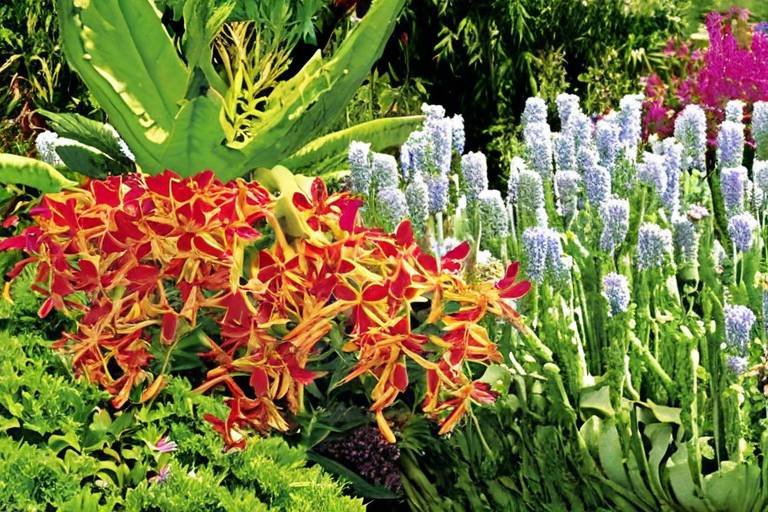How to Grow Your Own Organic Vegetables
Are you ready to embark on a journey of cultivating your own organic vegetables right in your backyard? Growing organic vegetables is not only rewarding but also beneficial for your health and the environment. Let's dive into the step-by-step process that will guide you through selecting the right seeds, preparing the soil, planting and watering techniques, natural pest control methods, weed management strategies, maintaining organic certification, harvesting and storing produce, and the countless benefits that come with growing your own organic vegetables.

Selecting the Right Seeds
When it comes to selecting the right seeds for your organic vegetable garden, it's crucial to prioritize quality and sustainability. Opting for organic, non-GMO seeds ensures that your harvest is free from harmful chemicals and genetically modified organisms, promoting a healthier and more environmentally friendly garden.
Organic seeds are not only better for your health but also contribute to the overall well-being of the ecosystem. By choosing seeds that are free from synthetic pesticides and fertilizers, you are supporting biodiversity and natural pollination processes, creating a more balanced and resilient garden environment.
Before purchasing seeds, take the time to research reputable suppliers that specialize in organic and non-GMO varieties. Look for certifications such as USDA Organic or Non-GMO Project Verified to guarantee the authenticity and quality of the seeds you are buying.
Consider the specific needs of your garden and the growing conditions in your region when selecting seeds. Choose varieties that are well-suited to your climate and soil type, ensuring that they have the best chance of thriving in your garden environment.
Additionally, think about the types of vegetables you enjoy eating and prioritize those when selecting seeds. By growing vegetables that you love, you are more likely to stay engaged and committed to the cultivation process, resulting in a more successful and rewarding gardening experience.

Preparing the Soil
When it comes to growing organic vegetables, preparing the soil is a crucial step that sets the foundation for a successful harvest. The quality of your soil directly impacts the health and productivity of your plants. To ensure your organic vegetables thrive, it's essential to focus on creating nutrient-rich soil that provides the necessary elements for robust growth. One key aspect of preparing the soil is composting. Composting not only enriches the soil with essential nutrients but also improves its structure, drainage, and water retention capabilities. By recycling organic matter such as kitchen scraps, yard waste, and fallen leaves, you can create a sustainable source of nutrients for your plants.
Additionally, conducting a soil test before planting is highly recommended. A soil test helps determine the pH level of the soil and identifies any deficiencies or imbalances in nutrients. Based on the test results, you can adjust the soil pH and supplement any lacking nutrients to create an optimal growing environment for your organic vegetables. Maintaining the proper pH balance is crucial as it affects the availability of nutrients to the plants. Most vegetables prefer a slightly acidic soil with a pH range of 6.0 to 7.0. Adjusting the pH level ensures that your plants can efficiently absorb nutrients from the soil, promoting healthy growth and development.
Another important aspect of soil preparation is ensuring good drainage. Poorly drained soil can lead to waterlogged conditions, which can be detrimental to plant roots. To improve drainage, consider incorporating organic matter such as compost or aged manure into the soil. This helps loosen compacted soil, allowing excess water to drain away effectively. Proper drainage is essential for preventing waterlogging and ensuring that oxygen reaches the roots, facilitating nutrient uptake and overall plant health.
In addition to composting, soil testing, and ensuring good drainage, it's also beneficial to practice crop rotation in your vegetable garden. Crop rotation involves planting different crops in the same area each season to prevent the buildup of pests and diseases specific to certain plant families. This practice helps maintain soil health and fertility while reducing the risk of pest infestations and diseases. By rotating crops, you can effectively manage soil nutrients, minimize soil-borne diseases, and promote overall plant vigor in your organic vegetable garden.

Planting and Watering Techniques
When it comes to planting and watering your organic vegetables, there are some key techniques to keep in mind to ensure a successful harvest. First and foremost, it's essential to choose the right spot in your garden that receives an adequate amount of sunlight and has well-draining soil. Different vegetables have varying sunlight and spacing requirements, so be sure to research each plant's specific needs before planting.
Before planting your seeds or seedlings, it's crucial to prepare the soil properly. This includes loosening the soil to allow for root growth, incorporating organic matter like compost to improve soil fertility, and ensuring the soil is at the right pH level for optimal nutrient absorption. Healthy soil is the foundation for healthy plants.
When planting your seeds, follow the instructions on the seed packet regarding planting depth and spacing. For seedlings, gently remove them from their containers and transplant them into the soil, being careful not to damage the roots. Water the newly planted seeds or seedlings thoroughly to help them establish roots in their new environment.
Proper watering is key to the success of your vegetable garden. Different vegetables have different water requirements, so it's essential to water them accordingly. Overwatering can lead to root rot, while underwatering can stunt growth and reduce yield. A good rule of thumb is to water deeply and infrequently, allowing the soil to dry out slightly between waterings.
Consider using mulch around your plants to help retain soil moisture, suppress weeds, and regulate soil temperature. Mulching can also reduce the need for frequent watering by slowing down evaporation. Additionally, using a soaker hose or drip irrigation system can deliver water directly to the roots of your plants, minimizing water waste and promoting efficient water usage.
Regularly monitor the moisture levels of your soil by checking the depth of the soil with your finger. If the top few inches are dry, it's time to water. Remember that watering in the morning is ideal, as it allows the plants to absorb the moisture before the heat of the day evaporates it.
By following these planting and watering techniques, you can set your organic vegetable garden up for success and enjoy a bountiful harvest of fresh, nutritious produce.

Natural Pest Control Methods
Learn the step-by-step process of cultivating organic vegetables in your garden, from selecting the right seeds to maintaining soil health and harvesting fresh produce.
Understand the importance of choosing organic, non-GMO seeds for your vegetable garden and how it impacts the quality and sustainability of your harvest.
Discover the essential steps to prepare nutrient-rich soil for planting organic vegetables, including composting, soil testing, and proper pH balance.
Explore the best practices for planting organic vegetable seeds or seedlings and maintaining proper watering schedules to ensure healthy growth and development.
When it comes to protecting your organic vegetables from pesky invaders, eco-friendly pest control methods are the way to go. These methods focus on using natural solutions to keep your plants safe without resorting to harmful chemicals that can harm the environment and your health.
One effective natural pest control method is companion planting, where certain plants are grown together to repel pests or attract beneficial insects that prey on pests. For example, planting marigolds alongside your vegetables can help deter nematodes and other harmful insects.
Biological pest control is another eco-friendly approach that involves introducing natural predators of pests into your garden. Ladybugs, praying mantises, and parasitic wasps are examples of beneficial insects that can help keep pest populations in check.
Implement effective weed control methods to prevent weed competition, promote healthy plant growth, and maintain the organic integrity of your vegetable garden.
Understand the requirements and procedures for obtaining and maintaining organic certification for your vegetable garden to ensure compliance with organic standards.
Discover the optimal time to harvest your organic vegetables, proper harvesting techniques, and storage methods to preserve freshness and flavor.
Explore the numerous benefits of growing your own organic vegetables, including improved health, environmental sustainability, and cost savings.
Have more questions about growing organic vegetables? Check out some common FAQs below:
- Q: Can I use chemical pesticides on organic vegetables?
- A: No, organic vegetables should be grown without the use of chemical pesticides to maintain their organic integrity.
- Q: How can I improve soil health for organic gardening?
- A: You can improve soil health by adding compost, using cover crops, and rotating crops to prevent nutrient depletion.
- Q: What are some common pests that attack organic vegetables?
- A: Common pests include aphids, caterpillars, and slugs. Implementing natural pest control methods can help manage these pests effectively.

Weed Management Strategies
Weed management is a critical aspect of maintaining a successful organic vegetable garden. Weeds not only compete with your plants for nutrients, water, and sunlight but can also harbor pests and diseases. To effectively manage weeds without compromising the organic integrity of your garden, it is essential to implement strategic strategies.
One effective weed management strategy is mulching. Mulching involves covering the soil around your plants with organic materials such as straw, leaves, or grass clippings. Not only does mulch suppress weed growth by blocking sunlight, but it also helps retain soil moisture and regulate soil temperature. Additionally, as the mulch breaks down, it adds valuable organic matter to the soil, improving its overall health.
Another approach to weed management is hand weeding. While it may be labor-intensive, hand weeding allows you to target and remove weeds individually, ensuring they do not spread and compete with your vegetable plants. Regularly inspecting your garden and pulling out weeds by hand before they have a chance to establish themselves can significantly reduce weed pressure.
Crop rotation is a proactive weed management technique that can help disrupt the life cycles of weeds and prevent them from becoming established. By rotating your vegetable crops each season, you can confuse and deter weed growth, as different plants have varying nutrient needs and growth patterns. This practice also helps maintain soil fertility and reduces the likelihood of weed infestations.
Utilizing cover crops is another effective weed management strategy. Cover crops are planted between growing seasons to cover and protect the soil. They help suppress weeds by outcompeting them for resources and can also improve soil structure and fertility. Leguminous cover crops, such as clover or vetch, can also fix nitrogen in the soil, reducing the need for synthetic fertilizers.
Lastly, practicing good garden hygiene can contribute to weed management. Keeping your garden clean and free of debris can eliminate potential weed habitats and breeding grounds. Regularly removing spent plants, fallen leaves, and other organic matter can prevent weed seeds from germinating and spreading throughout your garden.

Maintaining Organic Certification
Obtaining and maintaining organic certification for your vegetable garden is essential to ensure that your produce meets the required organic standards. To maintain organic certification, you must adhere to specific guidelines and practices that promote sustainability and environmental responsibility. This certification demonstrates your commitment to producing organic vegetables that are free from synthetic chemicals and genetically modified organisms.
One of the key aspects of maintaining organic certification is keeping detailed records of your gardening practices. This includes documenting the sources of your seeds, any fertilizers or amendments used, pest control methods applied, and harvest yields. These records serve as evidence of your compliance with organic regulations and may be subject to inspection by certifying agencies.
Additionally, it is important to stay informed about any updates or changes in organic standards to ensure ongoing compliance. Regularly review the requirements set forth by certifying bodies and make any necessary adjustments to your gardening practices to align with the latest guidelines.
Implementing crop rotation and cover cropping techniques can also contribute to maintaining organic certification. These practices help improve soil health, prevent pest and disease issues, and promote biodiversity in your garden, all of which are important factors in organic farming.
Furthermore, engaging in continuous education and training on organic gardening practices can enhance your knowledge and skills in sustainable agriculture. Stay connected with organic farming communities, attend workshops or seminars, and seek guidance from experienced organic growers to stay updated on best practices.
By following these guidelines and practices, you can ensure the continued certification of your vegetable garden as organic. Maintaining organic certification not only benefits your own garden but also contributes to the larger movement towards sustainable and environmentally friendly agriculture.

Harvesting and Storing Produce
When it comes to harvesting and storing produce from your organic vegetable garden, timing is key. The optimal time to harvest your vegetables varies depending on the type of crop you are growing. Vegetables like tomatoes and peppers are best picked when they reach full ripeness, while leafy greens such as lettuce and spinach should be harvested when they are young and tender.
Proper harvesting techniques play a crucial role in maintaining the freshness and flavor of your organic vegetables. It is essential to use sharp tools to avoid damaging the plants and to harvest in the early morning when the vegetables are at their peak freshness. Handling the produce carefully and avoiding bruising or crushing will help prolong its shelf life.
Storing your harvested organic vegetables correctly is vital to preserve their quality. Some vegetables, like root crops and winter squash, can be stored in a cool, dark place with good ventilation to prevent spoilage. Leafy greens and herbs, on the other hand, should be stored in the refrigerator in airtight containers or bags to maintain crispness.
For longer-term storage, consider techniques such as canning, freezing, or drying your surplus produce. Canning is a great way to preserve fruits and vegetables in jars using heat, while freezing allows you to store produce for several months without losing nutritional value. Drying herbs and certain vegetables like tomatoes can extend their shelf life and provide you with homegrown ingredients year-round.
Remember, the goal of harvesting and storing produce from your organic vegetable garden is to enjoy the fruits of your labor for as long as possible. By following proper harvesting and storage practices, you can savor the flavors of your homegrown vegetables well beyond the harvest season.

Benefits of Growing Organic Vegetables
Learn the step-by-step process of cultivating organic vegetables in your garden, from selecting the right seeds to maintaining soil health and harvesting fresh produce.
Understand the importance of choosing organic, non-GMO seeds for your vegetable garden and how it impacts the quality and sustainability of your harvest.
Discover the essential steps to prepare nutrient-rich soil for planting organic vegetables, including composting, soil testing, and proper pH balance.
Explore the best practices for planting organic vegetable seeds or seedlings and maintaining proper watering schedules to ensure healthy growth and development.
Learn about eco-friendly pest control solutions to protect your organic vegetables from common garden pests without the use of harmful chemicals.
Implement effective weed control methods to prevent weed competition, promote healthy plant growth, and maintain the organic integrity of your vegetable garden.
Understand the requirements and procedures for obtaining and maintaining organic certification for your vegetable garden to ensure compliance with organic standards.
Discover the optimal time to harvest your organic vegetables, proper harvesting techniques, and storage methods to preserve freshness and flavor.
Growing your own organic vegetables brings a plethora of benefits that go beyond just the satisfaction of harvesting your own produce. By cultivating organic vegetables, you are not only ensuring a fresh and healthy food source for you and your family but also contributing to a more sustainable environment. Organic vegetables are free from harmful pesticides and chemicals, making them safer and healthier to consume. Additionally, growing your own organic vegetables can lead to cost savings in the long run as you reduce your dependency on store-bought produce. Embracing organic gardening practices can also improve your overall well-being by providing you with nutritious and flavorful vegetables that are rich in essential vitamins and minerals.
Stay tuned for answers to common queries about growing organic vegetables!
Frequently Asked Questions
- What are the benefits of growing organic vegetables?
Growing organic vegetables offers numerous benefits, including improved health due to the absence of harmful chemicals, environmental sustainability by reducing pollution and preserving biodiversity, and cost savings in the long run as you produce your own fresh produce.
- How can I control pests in my organic vegetable garden without chemicals?
There are several eco-friendly pest control methods you can use, such as introducing beneficial insects, setting up physical barriers, using neem oil or garlic spray, and practicing crop rotation to deter pests naturally.
- What is the importance of maintaining organic certification for my vegetable garden?
Maintaining organic certification ensures that your vegetables meet the required organic standards, giving you credibility as a sustainable and environmentally conscious grower. It also allows you to sell your produce as certified organic, commanding higher prices in the market.


















